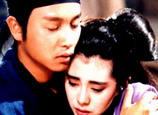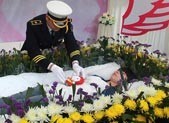
In 1976, when Beijing residents put up makeshift tents on the streets as shelters from a possible earthquake, Li stayed with Jia's family in the same tent and told stories about Pu Yi.
"That marked the start of my interest into the lives of the country's last royal family," Jia recalls.
Interest is one thing, writing a book about the latter half of Pu Yi's life is another.
What ignited Jia's interest in writing a book was the request from the editors of a magazine for a story about Pu Yi's life in 1979.
But he did not have the confidence to finish a book until a research fellow from Jilin Academy of Social Sciences cajoled him into handing over the more than 100 pages Jia had spent his spare time writing.
Based on the material, the fellow published a book. This research fellow had humiliated him by saying that Jia was not competent enough to write the book.
"I was enraged," Jia recalls. "I just wanted to let him know that I not only could write the book, but could also produce an excellent one."
That was the turning point. Jia decided to work harder.
In 1981, on his honeymoon leave, he visited Liu Bao'an, a retired man who had once lived in the same room with Pu Yi in Beijing's Botanical Garden.
The nursing home where Liu was staying at the time was in the suburb of Penglai, Shandong province. Both of them clicked like old friends as soon as they met.
The old man gave Jia all the letters Pu Yi had written to him and told him a lot of anecdotes about the last emperor.
His book was finally published in 1989. But the author who had cajoled Jia out of his manuscripts a decade ago sued him for plagiarizing.
Jia faced a lot of pressure at the time.
 |  |
















 Experience death, reflect life: Girl stages her own fake funeral
Experience death, reflect life: Girl stages her own fake funeral


![]()
